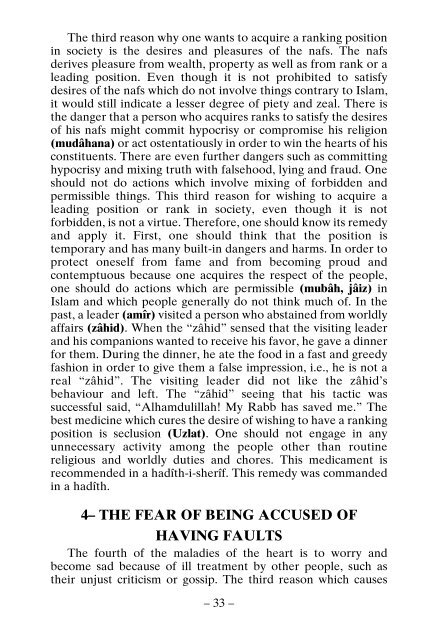Ethics of Islam
Ethics of Islam is taken from the book Berîka by Muhammad Hâdimi. Immorality and ways to get rid of it; 40 depravities and cures to them; usefulness of ethics; what is a soul; strengths of a soul; Personalities emanating from wisdom, courage, chastity and justice are extensively explained.
Ethics of Islam is taken from the book Berîka by Muhammad Hâdimi. Immorality and ways to get rid of it; 40 depravities and cures to them; usefulness of ethics; what is a soul; strengths of a soul; Personalities emanating from wisdom, courage, chastity and justice are extensively explained.
You also want an ePaper? Increase the reach of your titles
YUMPU automatically turns print PDFs into web optimized ePapers that Google loves.
The third reason why one wants to acquire a ranking position<br />
in society is the desires and pleasures <strong>of</strong> the nafs. The nafs<br />
derives pleasure from wealth, property as well as from rank or a<br />
leading position. Even though it is not prohibited to satisfy<br />
desires <strong>of</strong> the nafs which do not involve things contrary to <strong>Islam</strong>,<br />
it would still indicate a lesser degree <strong>of</strong> piety and zeal. There is<br />
the danger that a person who acquires ranks to satisfy the desires<br />
<strong>of</strong> his nafs might commit hypocrisy or compromise his religion<br />
(mudâhana) or act ostentatiously in order to win the hearts <strong>of</strong> his<br />
constituents. There are even further dangers such as committing<br />
hypocrisy and mixing truth with falsehood, lying and fraud. One<br />
should not do actions which involve mixing <strong>of</strong> forbidden and<br />
permissible things. This third reason for wishing to acquire a<br />
leading position or rank in society, even though it is not<br />
forbidden, is not a virtue. Therefore, one should know its remedy<br />
and apply it. First, one should think that the position is<br />
temporary and has many built-in dangers and harms. In order to<br />
protect oneself from fame and from becoming proud and<br />
contemptuous because one acquires the respect <strong>of</strong> the people,<br />
one should do actions which are permissible (mubâh, jâiz) in<br />
<strong>Islam</strong> and which people generally do not think much <strong>of</strong>. In the<br />
past, a leader (amîr) visited a person who abstained from worldly<br />
affairs (zâhid). When the “zâhid” sensed that the visiting leader<br />
and his companions wanted to receive his favor, he gave a dinner<br />
for them. During the dinner, he ate the food in a fast and greedy<br />
fashion in order to give them a false impression, i.e., he is not a<br />
real “zâhid”. The visiting leader did not like the zâhid’s<br />
behaviour and left. The “zâhid” seeing that his tactic was<br />
successful said, “Alhamdulillah! My Rabb has saved me.” The<br />
best medicine which cures the desire <strong>of</strong> wishing to have a ranking<br />
position is seclusion (Uzlat). One should not engage in any<br />
unnecessary activity among the people other than routine<br />
religious and worldly duties and chores. This medicament is<br />
recommended in a hadîth-i-sherîf. This remedy was commanded<br />
in a hadîth.<br />
4– THE FEAR OF BEING ACCUSED OF<br />
HAVING FAULTS<br />
The fourth <strong>of</strong> the maladies <strong>of</strong> the heart is to worry and<br />
become sad because <strong>of</strong> ill treatment by other people, such as<br />
their unjust criticism or gossip. The third reason which causes<br />
– 33 –

















